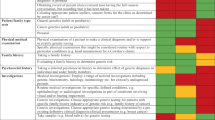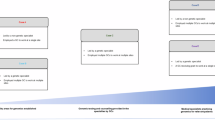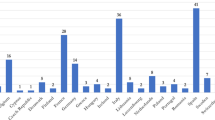Abstract
The American College of Medical Genetics and Genomics released recommendations for reporting incidental findings (IFs) in clinical exome and genome sequencing. These suggest ‘opportunistic genomic screening’ should be available to both adults and children each time a sequence is done and would be undertaken without seeking preferences from the patient first. Should opportunistic genomic screening be implemented in the United Kingdom, the Association of Genetic Nurses and Counsellors (AGNC), which represents British and Irish genetic counsellors and nurses, feels strongly that the following must be considered (see article for complete list): (1) Following appropriate genetic counselling, patients should be allowed to consent to or opt out of opportunistic genomic screening. (2) If true IFs are discovered the AGNC are guided by the report from the Joint Committee on Medical Genetics about the sharing of genetic testing results. (3) Children should not be routinely tested for adult-onset conditions. (4) The formation of a list of variants should involve a representative from the AGNC as well as a patient support group. (5) The variants should be for serious or life-threatening conditions for which there are treatments or preventative strategies available. (6) There needs to be robust evidence that the benefits of opportunistic screening outweigh the potential harms. (7) The clinical validity and utility of variants should be known. (8) There must be a quality assurance framework that operates to International standards for laboratory testing. (9) Psychosocial research is urgently needed in this area to understand the impact on patients.
Similar content being viewed by others
Log in or create a free account to read this content
Gain free access to this article, as well as selected content from this journal and more on nature.com
or
References
Green RC, Berg JS, Grody WW et al: ‘ACMG recommendations for reporting of incidental findings in clinical exome and genome sequencing.’. Genet Med 2013; 15: 565–574.
Royal College of Physicians, Royal College of Pathologists, British Society for Human Genetics. 2011, ‘Consent and confidentiality in clinical genetic practice: guidance on genetic testing and sharing genetic information.’ Report of the Joint Committee on Medical Genetics 2nd edn. Available from http://www.bsgm.org.uk/media/678746/consent_and_confidentiality_2011.pdf.
British Society of Human Genetics. 2010, ‘Report on the genetic testing of children.’ Retrieved 25/11/13, available from http://www.bsgm.org.uk/media/678741/gtoc_booklet_final_new.pdf.
Author information
Authors and Affiliations
Consortia
Corresponding author
Ethics declarations
Competing interests
The authors declare no conflict of interest.
Rights and permissions
About this article
Cite this article
Middleton, A., Patch, C., Wiggins, J. et al. Position statement on opportunistic genomic screening from the Association of Genetic Nurses and Counsellors (UK and Ireland). Eur J Hum Genet 22, 955–956 (2014). https://doi.org/10.1038/ejhg.2013.301
Received:
Revised:
Accepted:
Published:
Issue date:
DOI: https://doi.org/10.1038/ejhg.2013.301
Keywords
This article is cited by
-
Attitudes among South African university staff and students towards disclosing secondary genetic findings
Journal of Community Genetics (2021)
-
Ethical values supporting the disclosure of incidental and secondary findings in clinical genomic testing: a qualitative study
BMC Medical Ethics (2020)
-
Familial/inherited cancer syndrome: a focus on the highly consanguineous Arab population
npj Genomic Medicine (2020)
-
Exploring neurologists’ perspectives on the return of next generation sequencing results to their patients: a needed step in the development of guidelines
BMC Medical Ethics (2018)
-
Incidental or secondary findings: an integrative and patient-inclusive approach to the current debate
European Journal of Human Genetics (2018)



